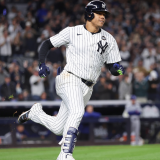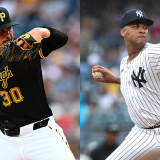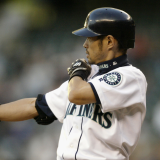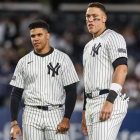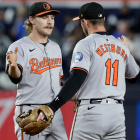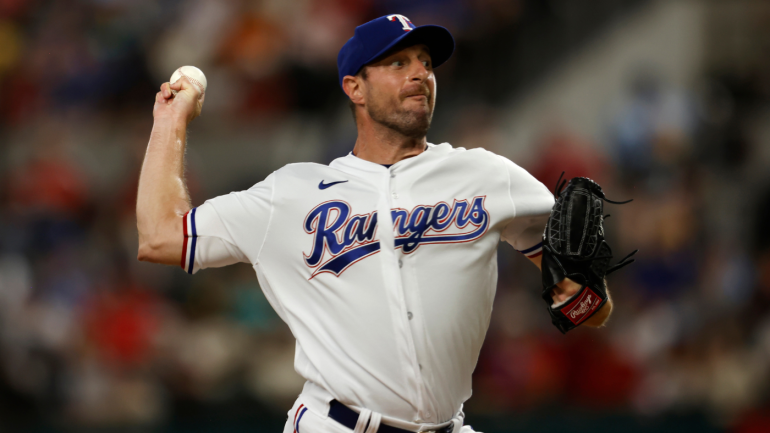
Wednesday's Game 3 of the American League Championship Series occasions Max Scherzer's return to the mound as his Rangers attempt to take a 3-0 lead on the Astros.
The 39-year-old future Hall of Famer and Texas' leading trade-deadline addition has been sidelined since Sept. 12 because of a strained teres major muscle in his right shoulder. That injury caused him to miss the final weeks of Texas' high-stakes stretch drive in addition to the Wild Card Series and Division Series. Needless to say, Scherzer's return is the leading subplot of Game 3, which amounts to a must-win contest for the reigning-champion Astros. Let's set the scene with some things to know about Scherzer's big start.
He's coming back within his stated timeline but despite early pessimism
"When this injury happened, we were kind of in that four- to six-week window," Scherzer told reporters on Tuesday. "... I took one day to feel bad about it and the next day I was back to grinding because I knew we have a team that can compete with anybody."
Game 3 will mark 36 days since his last start – a strong five innings against the Blue Jays – so he's somewhere around the five-week mark. That's pretty much in the middle of that four- to six-week timeframe, which theoretically means Scherzer isn't rushing it.
Indeed, when Scherzer was added to the Rangers' ALCS roster, he said he wasn't coming back in a compromised state. "I've pressed all the buttons I can. I'm ready to go….I feel normal," he told Evan Grant of the Dallas Morning News. "That's all I can say. All I can do is describe what I feel like and if I have an issue, I have to let them know. But my arm feels fresher."
That said, let's recall that initially Rangers general manager Chris Young said Scherzer was "unlikely" to pitch in the postseason. That expectation has quite obviously been flipped, but the initial pessimism speaks to the compromising nature of an injury to a muscle that plays the very essential role of connecting arm to shoulder.
He'll be on a pitch count
While Scherzer says he feels normal, the reality is that he's not stretched out to max capacity. Indeed, when it was clear the injury would keep him on ice for at least part of the postseason, a return to the bullpen was floated. That obviously didn't turn out to be the case, but you're still probably not going to see an ace's workload from Scherzer in Game 3 against Houston.
So what kind of length can they get out of Scherzer? "He threw 69 pitches facing hitters a week or so ago, so that's the starting point," manager Bruce Bochy told reporters. "Obviously, we will watch the innings and how stressful they are and how he feels."
It's guesswork, but Bochy referring to 69 pitches as a starting point may suggest something in the 75-80 range. That, of course, is highly dependent upon how hard he's forced to work in a given inning and how he's faring against the potent Houston lineup.
That likely pitch count will be quite a departure for Scherzer in the postseason. Across his 22 career postseason starts, he's averaged 96.5 pitches per start. Elsewhere on the pitch-count front, there's a potential silver lining for Scherzer in Game 3. The Astros this season ranked just 28th in MLB in pitches seen per plate appearance. Obviously, how well a lineup keeps the line moving and avoids outs is the real driver of pitch counts, but a secondary consideration is that Houston hitters in general aren't count-workers.
What Bochy and the Rangers hope to avoid is a greatly abbreviated outing for Scherzer, given their thin and dubious bullpen and with no off days scheduled until prior to a potential Game 6 back in Houston.
The Astros' hitters will present a challenge to Scherzer
The Houston offense this season ranked fifth in MLB in runs scored and also fifth in OPS. Against right-handed pitchers, of which Scherzer is one, they ranked eighth in OPS. While they were better against lefties (second in OPS vs. LHPs), Houston can still handle right-handers. On an individual level, Michael Brantley is one to watch. He's logged 54 career plate appearances versus Scherzer, and over that span he's put up a slash line of .367/.389/.755 with three home runs and eight doubles.
This season, Scherzer faced the Astros twice, once with the Mets and once after the trade to Texas. In those two starts, he had an ERA of 6.55 with four home runs allowed in 11 innings and 12 strikeouts against three walks. Scherzer's long-ball tendencies are his most notable weakness (albeit one that hasn't prevented him from being one of the best pitchers of his era). On that point, it's worth noting that Globe Life Field in Arlington, the site of Game 3, has quite substantially inflated home run rates over the last two seasons, at least according to Statcast calculations.
As for Scherzer's postseason history, it's not quite up to his regular-season standards but it's still good overall. Across 133 1/3 playoff innings – five relief appearances and those 22 starts noted above – Scherzer has an ERA of 3.58 with 164 strikeouts, 48 unintentional walks, and 18 home runs allowed.


